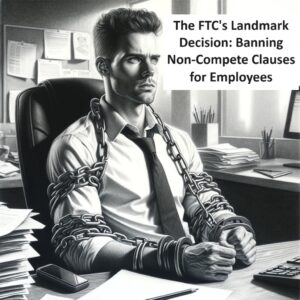
Introduction
In a very bold move, on April 23, 2024, the Federal Trade Commission (FTC) issued a transformative rule that bans almost all non-compete clauses in employment contracts across the United States. This sweeping move aims to enhance worker mobility, boost wages, and stimulate economic innovation. Non-compete clauses have long been viewed with disfavor by the courts and have often been enforced with narrow interpretations of their scope.
Below is a discussion of the nuances of this new rule and its potential impacts on employers and employees alike.
Overview of the New FTC Rule
The FTC’s final rule broadly prohibits the use of non-compete clauses, which are terms in employment contracts that restrict employees from joining competing firms or starting similar businesses within a certain period after leaving a company. The rule applies to all workers—whether employees or independent contractors—operating in for-profit enterprises. The rule also operates retrospectively, thereby voiding all current non-compete clauses with one notable exception for senior executives. These executives are defined as those who hold policy-making positions and earn at least $151,164 annually. This exception only applies to the retroactive voiding of current non-compete clauses. However, the rule prospectively prohibits entering into new non-compete clauses even with senior executives.
Exception for Sale of Business
The new FTC rule on non-compete clauses includes specific exceptions for non-competes that are part of the bona fide sale of a business. Under this exception, non-compete agreements can still be enforced if they are entered into as part of the sale of a business entity, the seller’s ownership interest in a business entity, or substantially all of a business entity’s operating assets. This exception recognizes the legitimate interest that buyers have in protecting the value of their newly acquired business by restricting the seller from immediately starting a competing business. However, the FTC emphasizes that for a sale to qualify under this exception, it must be a bona fide transaction between independent parties at arm’s length, providing the seller with a reasonable opportunity to negotiate the terms of the sale.
Notification Requirements
A critical aspect of the rule is the requirement for employers to notify current and former employees that previous non-compete agreements are no longer enforceable. This communication must be clear and comply by a set deadline, providing employees with certainty about their rights and freedoms.
Economic and Social Implications
According to FTC Chair Lina M. Khan, the rule is expected to generate over 8,500 new businesses each year and enable workers to earn an additional average of $524 annually. The rationale is that non-compete agreements have historically suppressed salary increments and hindered the free movement of talent, thereby stifling innovation and economic growth.
Legal Challenges and State Law Interaction
The rule is already facing legal challenges, particularly concerning the FTC’s authority to enact such a sweeping prohibition. These challenges might delay or impact the implementation of the rule. Additionally, while the FTC’s rule preempts state laws that are less restrictive, it does not override state laws that provide greater protection against non-compete agreements.
Effective Date of Regulation
Subject to the outcome of various challenges, the FTC’s rule banning non-compete clauses is set to take effect 120 days after its publication in the Federal Register. This timeline places the expected implementation date around late August 2024.Top of Form
Conclusion
The FTC’s new rule on non-compete clauses is a bold step towards enhancing economic liberty and competition in the U.S. labor market. It promises to empower workers with more freedom to change jobs and pursue opportunities without fear of legal repercussions. However, the path forward is fraught with legal complexities and potential resistance from various stakeholders. As the rule approaches its effective date and potential court battles loom, its ultimate impact remains a topic of keen interest and debate.
